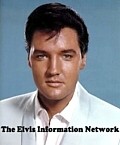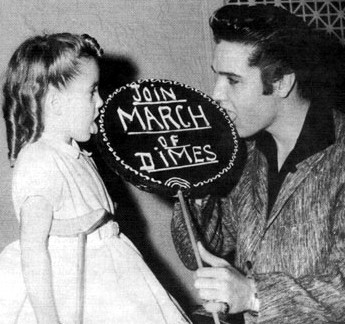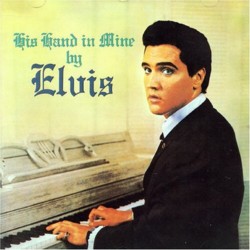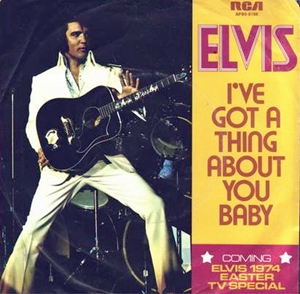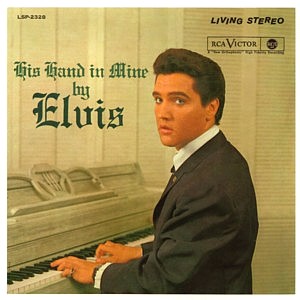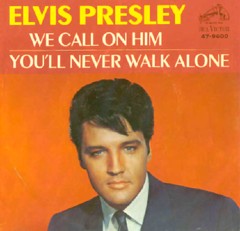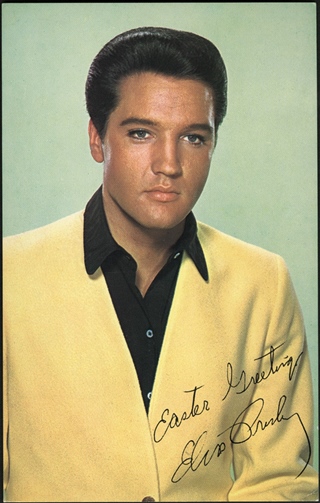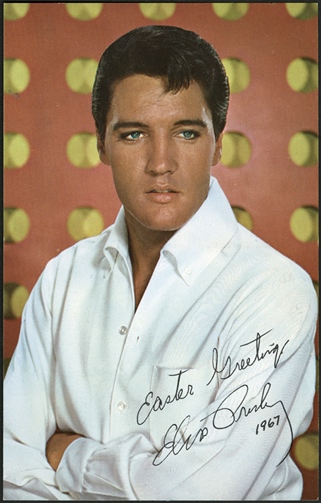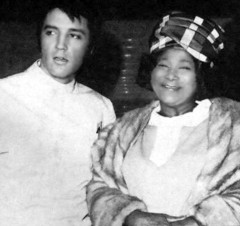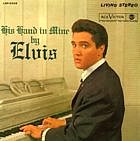 |
 |

Sirius Radio DJ, 'Doc Walker': On the Easter Special FTD you start the CD off with a ‘March of Dimes’ track commercial with Elvis from 1957. Where did you find that & why did you include that particular track on this CD? Ernst: Well I thought it was a caring & loving message & that it was unusual. We don’t normally hear Elvis champion any causes in public. We know he did in private & was very very generous but here he is, actually with a photo included in the CD & with a little talk, and he takes a stand and steps out and publicly helps people. This was in early 57, when he was certainly at a real high of his career, and we thought that message was a perfect lead in to a sincere song like 'It is No Secret what God can do" because it’s a little bit on those lines. You know we’d all like God's intervention on matters like that and we thought it had the spirit of that. When you ask where we found it, we actually found it in an unmarked tape box at RCA, well unmarked to the extent where it didn’t say Elvis Presley, it said March Of Dimes and it just turned up at one of our vault searches several years ago & I was thrilled, I think it’s a great piece.
DOC: Well let's talk about that very first track that you begin that CD with after the March of Dimes, it’s the only one that you’ve included on the Easter Special CD from 1957 – 'It is no Secret' – tell us about that. Ernst: Well, the puzzling element obviously is how planned was that gospel EP 'Peace in the Valley'. We know that Elvis went on the Ed Sullivan show on January 6 and sang 'Peace in the Valley' & it was part of that whole thing that Ed Sullivan claims "this is a nice decent young man" or whatever it is he said & I’ve always been curious about whether that triggered the recording or whether the recording was planned already. I mean we know that Elvis just a few weeks earlier on the Million Dollar Quartet sung his heart out with Carl Perkins & Jerry Lee Lewis on every gospel song he knew. But 'It is No Secret' is not 'Peace in the Valley', it is one of the 3 songs Elvis chooses after he’s done 'Peace in the Valley' on TV. I think it has a sincerity to it that went so well with the March of Dimes statement where you could say that 'I Believe' is a little more "pop dramatic". I think there is something calm & sincere about 'It is no Secret' that made me choose that in you know favour of outtakes of the others.
Ernst: I need to tell you another story first. When I was a kid the first Elvis album I ever bought was 'His Hand in Mine' after listening to the title track on the radio. Back then you could walk into a record store where they had booths where you could listen to the entire album & I remember walking in there with my mother. We were sitting there listening to that album & I thought it was absolutely wonderful, but I knew that down the street I could buy it for a dollar less. So I went back out into the shop & said, "Well that wasn’t really anything" & felt like the biggest liar in the world! (laughing) and then I walked down the street & bought a sealed imported copy from the US for 1 dollar less! … But back to your question. I love that album but the track I really found that was different & interesting was the first of the ones we used on the CD, 'He Knows Just What I Need' because I love the part that Charlie Hodge does as a second voice to Elvis' in the high voice. Eventually they give it up because Charlie's voice is nearly breaking. But it sounds so passionate and I think that, as you know we all feel the loss of Charlie not being here anymore, when you ask me that question I remember & said, yeah Charlie could really sing! Of course we knew he could because he sang on 'I Will Be Home Again' but I thought that maybe this Easter we should make this a little tribute to Charlie who certainly shared all his gospel music knowledge with Elvis - & I’m quite sure inspired him. (EIN note: Click here for our Special Tribute & exclusive interview with Charlie Hodge) When you talk about the context of this album, there’s a lot of Elvis doing the Blackwood Brothers & The Statesman Quartet, two of his favourite bands. But one of the things that’s interesting here & has never been contradicted was that these oddly titled songs like 'Joshua Fit The Battle' & 'Swing Down Sweet Chariot' Elvis actually learned from the Golden Gate Quartet & the one who actually opened Elvis’ eyes & ears to the Golden Gate Quartet was Charlie Hodge. Whilst in Germany he played Elvis some of these Gold Gate Quartet albums for Elvis & Elvis got obviously tickled by these masterful performances by the original big great black gospel groups. Golden Gate Quartet is in my mind the father of Gospel music (laughing) & I’m sure it's theoretically not, but to many people it was & I think you see Charlie's influences on 'His Hand in Mine' by these choices.
DOC: How much influence did you think The Jordanaires & their spirituals had on this particular record? Ernst: Well not on necessarily every track, but obviously they knew the same songs that Elvis & Charlie did & there is a wonderful story that Gordon Stoker always tells about the publishing fighting that went on in the back of it all.. claiming songs & the usual business things. That eventually when Elvis cut 'I’m Gonna Walk Dem Golden Stairs' Gordon called the writer Cully Holt & said Elvis has recorded one of your songs. Cully was about to call and claim his rights & stuff but Gordon warned him & said, "No don’t do a thing because they think it's public domain & if you step up & say its yours then suddenly they’re going to fight with you to get some of the mechanical royalties". So there is maybe not a very religious situation - but in reality is how the music business works. DOC: You’ve included 4 tracks on the Easter Special CD from the sessions that took place in May of 1966. One of my favourites being 'Run On', you included take two. Let's talk about those sessions, how did they differ from the 'His Hand in Mine' sessions & what was your favourite track from the 4 that you included of these 'How Great Though Art' sessions? Ernst: I think my favourite on that album has kept changing over the years & there is sometimes a little fatigue for instance for ‘How Great Thou Art’ which is a masterful performance but which is not included here. But when I bought the album originally it was ‘So High’ that was my favourite but then it has changed a lot over the years. I think the real important thing here is that ‘His Hand in Mine’ was the loving tribute to Elvis’ musical heroes in that genre and quite traditional in that respect. I think ‘How Great Thou Art’ is a daring cutting-edge Gospel record that was way ahead of its time. I mean you have steel guitars with fuzz-pedals on here, you have 10 or 11 singers singing at one time, it’s just such a marvellous musical trip. You know in the world of 1967 when the album came out everyone was into Dylan, the Beatles, The Beach Boys, The Doors .. & nobody realised, even if he won a Grammy, fully realised how much ahead of his time this album was & how immaculate it is. The repertoire is somewhat different, the atmosphere is somewhat more dark than it is on ‘His Hand In Mine’ but I think the music here is marvellous & Elvis’ sincerity shines through all of it & his level of ambition - he wanted to do something more than he’d done before. I mean not everything worked out the way he wanted because he wanted the bass singer of the Harmonising Four, a gospel group that he liked tremendously (not as well known as the Statesmen Quartet or Golden Gate Quartet) but his people couldn’t find him. That’s when Chet Atkins’ assistant, Mary Jarvis (she was actually Mary Lynch then but she later married Elvis’ producer Felton Jarvis) suggested that Elvis would get his old favourites The Statesman Quartet to sing along with The Jordanaires. I don’t know if there were any bruised egos on that but it sure sounds fantastic on the record.
Ernst: The idea on Easter Special was to cover the various sessions where Elvis recorded gospel music so we would pick one from any of these major sessions. And the reason he records that song & ‘You’ll Never Walk Alone’ was because The Colonel used every Easter to do an "Easter Special", thus the name of this little package! He took out adverts on radio & in the music trade & they played Elvis gospel music every Easter in America on syndicated radio shows & he wanted a new record to spearhead that thing for the spring of 1968 and that’s why they recorded a gospel single. Why we chose 'We Call On Him' over ‘You’ll Never Walk Alone’ is like the toss of a coin. But it’s interesting in that it showcases Elvis’ songwriter Ben Wiseman in writing a new religious song & that it wasn’t always old songs that were revamped in new arrangements. This was written specifically by the team of Karger/Wiseman & given to Elvis as a new religious song & it’s a very pretty song. I think we could all imagine it could also have been a love-song of a more worldly kind but I think it’s awfully pretty & again the sincerity of which that Elvis brought to his gospel session is certainly more sincere than (laughing) he brought to his soundtrack sessions. DOC: (laughing) No kidding! Let’s talk about ‘Saved’. You’ve included take one, it’s a Lieber & Stoller track, amazing songwriters – this was recorded on June 22, 1968 as Elvis was cutting tracks that were used in the NBC TV special. Tell us about that gospel melody & why you’ve just included a piece of this gospel melody in ‘Saved’. Ernst: Well the gospel melody was obviously part of the message that Elvis chose to send to the world when he made the 68 TV special that this was part of what he cared for & took seriously. And certainly had great vocal backing by The Blossoms with super-singer Darlene Love being part of that group. ‘Saved’ I think came to Elvis - his relationship with Lieber & Stoller was strong - but ‘Saved’ was in Elvis’ record collection a record by Laverne Baker. Elvis adored LaVern Baker, he went to shows with LaVern Baker back in 1954. He played ‘Tweedlee Dee’ live at his early live shows when he played all the little schoolhouses. I think Elvis felt that this was a very strong rock’n’roll & gospel song in one song. The reason we have included this here is that while the Gospel Medley is great, it is an orchestrated thing moving from The Blossoms opening ‘Sometimes I Feel like a Motherless Child’ through, ‘Where Could I go But to The Lord’ and it is as if, in our minds that, the gospel melody is one piece. But I actually think that ‘Saved’ is a great recording on its own and it was nice to hear it in isolation from the word go & all the way though. A second point here is that the way it’s recorded. When they recorded these gospel songs they recorded it in bits & pieces so we’ve not been fooled in taking a longer take & cutting it into two, no, this is where it starts. They did the 1st part, the 2nd part, the 3rd part and this is maybe the 7th part of that melody because they had this big band & Elvis singing along with them. And it was easier for the big orchestra to take smaller parts, finish them, then go into the next part & edit it all together afterwards.
DOC: Let’s jump ahead to sessions that took place in May 1971. Elvis cut tons of tracks between May 15 & 21st at RCA in Nashville, some of which were included on a Christmas record, some of which were included on the Elvis ‘Fool’ record. And also there were a few tracks from ‘He Touched Me’ and you’ve chosen some of these tracks. Talk about these sessions that produced these gospel tracks that you’ve included from May 1971 and how Elvis was recording 4 different records at once during these sessions! Ernst: Well the pressure was basically because he’d done so well the previous year in Nashville when he recorded about 30 sides over a week. These included what we know as the ‘That’s The Way It Is’ album, the ‘Elvis Country’ album & the ‘Love Letters’ album and they wanted to repeat that again in 71. In March they go in & wanted to start on this & there’s this idea of doing a folky type of album, but Elvis gets in trouble with his eyes & the glaucoma he was suffering from & they had to abandon the session after just recording 4 songs. So then they rescheduled it for May & the pressure from the record company to do a Christmas album is enormous. I think the pressure is much more prominent than Elvis’ real interest in cutting the Christmas album & that’s just one of the things they have to do. They have to do new singles and they want to do a pop album & then this gospel album that I’m sure Elvis took a real interest in. So he was in little bit of a mess here & what’s interesting is how they were able, night to night, to jump from one genre to another without a moment’s hesitation.
The other two, ‘There is No God’ is a nice pop song, but the other two that I really think people should listen to here is ‘He is My Everything’ & ‘Bosom of Abraham’. Certainly for the performances but what we did here is that we left a lot of Elvis goofing around & making fun & singing lines of other songs at the start of these two tracks & it gives you the joking, charming, creative atmosphere of the session. It is there before the music where you hear Elvis singing lines of ‘Mean Woman Blues’ & basically you get the feel for what it is. And that’s really what the Follow That Dream outtakes CD’s are about – to get you there, as if you were invited, as if you were a fly on the wall, or the producer there or just in the room. DOC: That’s why they’re my favourite Elvis CD’s Ernst: Yes, the first time I ever heard an outtake which is, what back in the 70s on ‘A Legendary Performer’, it just opened up this wonderful world that maybe a lot of people don’t understand - but I’m sure the serious listeners do. DOC: Well, when I listen to Elvis, I have listened so much like you have, like most fans have, to the released canon. And it’s the same when I listen to Dylan, the Beatles or Neil Young & the Byrds, and I know all those released albums backwards & forwards. And that’s why, with all those artists, I have gone to now listening to the bootlegs, or the outtakes, to see the evolution of those songs we have lived with for a lifetime. DOC: Let’s talk about the last two tracks on the Easter Special. You’ve included a Dennis Linde song & a Dottie Rambo song both from two different Stax sessions in 1973 in Memphis & I don’t think of ‘I’ve Got a Feeling in My Body’ as a gospel song, let’s talk about that one. Ernst; Well certainly it’s a very funky track in general & you’re certainly not the only one that says that’s more of a pop song. There’s a bunch of songs that people keep debating whether that’s gospel or not gospel. And I think to some extent that it is a little bit of a mute-point with Elvis because I don’t think that he really made those distinctions. I don’t think he thought of music as "music by genre" or put them into little boxes. Whatever made him feel good or in great spirits is what he recorded. So if you think this doesn’t belong here I’ll accept that, but at the time I felt & thought that it was a good statement & another way of Elvis breaching the genres of music that he cared so much about. ‘If That Isn’t Love’ is more of a grander finale type of song but again Elvis didn’t seem stuck with just one way of looking at any of the music genres that he worked with. So while this is obviously a far cry from ‘His Hand in Mine’ or the ‘Peace in the Valley’ EP I’ll give you that - and if you feel that these songs are not to the same extent gospel songs, well maybe you’re right! This transcript copyright EIN 2006. Major thanks to 'C&W' Rose for his invaluable assistance. Interview formatted by Piers Beagley. Click to comment on this Interview -
Note - EIN would like to thank ElvisSessions for supplying the interview. Click here to Sirius Elvis Radio Click here for Doc Walker's interview with Ernst about the 'Southern Nights' FTD Click here for Doc Walker's interview with Ernst about the 'Summer Festival' FTD Go here to read Ernst & Roger Semon's 2002 frank discussion about the FTD label and their releases. An EIN exclusive. Click to comment on this interview EIN Website content © Copyright the Elvis Information Network.
Elvis Presley, Elvis and Graceland are trademarks of Elvis Presley Enterprises. The Elvis Information Network has been running since 1986 and is an EPE officially recognised Elvis fan club.
|
|
